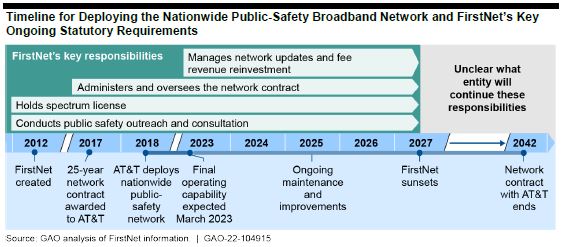GAO report outlines FirstNet Authority reauthorization options for Congress
Congress needs to reauthorize the FirstNet Authority within the next five years to ensure that the organization can maintain oversight of the nationwide public-safety broadband network (NPSBN) without interruption during the last 15 years of its contract with AT&T.
Under the 2012 law that created FirstNet, the FirstNet Authority’s authorization is set to expire after 15 years—in February 2027. Congress could pass legislation that could alter the organization’s makeup and place within the federal government—or shifting the FirstNet responsibility to another agency—in theory, but a recent Government Accountability Office (GAO) report on the matter does not encourage such changes
“Organizational transformations, such as changing the oversight and management functions of the network, could take many years to fully implement, affect productivity and morale in the short term, and may require up-front investments,” the GAO report states. “Letting FirstNet sunset and transferring the statutory responsibilities to another agency or agencies would certainly result in some costs, as described above—although the magnitude of such costs are unclear— and no clear benefits have been identified.”
Released on the 10th anniversary of the 2012 legislation being signed into law by then-President Barack Obama, the GAO states that “Congress should consider reauthorizing FirstNet, including different options for its placement, and provide it with authority to:
“• hold the single spectrum license for Band 14 for public-safety use;
“• administer and oversee the network contract;
“• manage network updates and fee revenue reinvestments; and
“• maintain a public-safety advisory committee to conduct public-safety outreach and consultation.”
If Congress does not reauthorize the FirstNet Authority for some reason, the FirstNet initiative would be fraught with questions, according to the GAO report.
“Without congressional action on FirstNet’s key statutory responsibilities described in this report, it is unclear how the federal government will continue to oversee network operations and the network’s required enhancements when FirstNet’s authority sunsets,” the GAO report states. “Given the interconnectedness of FirstNet’s ongoing key statutory responsibilities, dispersing these responsibilities among multiple federal agencies might complicate oversight, add complexity to continuing network operations, and lead to inefficiencies.
“As Congress considers the various options for managing the network, and their inherent advantages and disadvantages, it will be important to take some legislative actions, at the minimum, to ensure network continuity. Without any legislative action, the continued operation of the network would be jeopardized and could result in significant disruption for first responders who rely on the network for emergency response.”
Rep. Val Demings (D-Fla.) and Rep. Lizzie Fletcher (D-Texas) took a potential first step in this process, introducing a House bill last month that would extend the FirstNet Authority’s authorization indefinitely.
In addition to the 2027 reauthorization date, the FirstNet Authority is seeking FCC approval to extend its license to the 20 MHz of 700 MHz spectrum known as Band 14. The FirstNet Authority’s initial 10-year term of the Band 14 license is set to expire later this year, but the FCC is expected to renew the license, because the FirstNet Authority has met its buildout requirements and the network already is supporting more than 19,500 public-safety agencies with more than 3 million connections, according to AT&T.
FirstNet generally is viewed as a success story, particularly when compared to other large federal-government projects. In its early days, some critics labeled FirstNet as a potential financial drain, with parallels to U.S. Postal Service and Amtrak cited on numerous occasions. But those concerns have dissipated, as the FirstNet Authority typically has met its deadlines, remained within its budget, required no additional federal funds, and delivered an NPSBN that has exceeded the public-safety adoption that most projected at this stage.
Perhaps most impressively, the FirstNet Authority’s 25-year agreement with AT&T means that the organization is financially self-sustaining. This requirement of the 2012 law was one that many industry observers feared was not achievable, given that the funding allocated to the FirstNet Authority—$7 billion from the proceeds from FCC spectrum auctions—was estimated to be only a fraction of the money needed to build a nationwide LTE network, much less make it self-sustaining in the long term.
But the FirstNet Authority should be on solid financial footing through 2042, thanks to the organization’s 25-year contract with AT&T.
In 2017, AT&T was selected as the nationwide contractor, with the opportunity to earn as much as $6.5 billion in an incentive-laden deal for building the NPSBN within five years of being tasked to start the network deployment in March 2018. More important than the ability to earn $6.5 billion, AT&T gained the right to operate commercially on Band 14 spectrum, as long as public-safety traffic is given priority and preemption.
In return, the FirstNet Authority gets the nationwide public-safety LTE network that is expected to be upgraded to the latest technology—5G, 6G, 7G, etc.—for the next 25 years. In addition, the contract requires AT&T to make annual payments to the FirstNet Authority totaling $18 billion during the 25-year period of the contract, assuring that FirstNet would be a financially self-sustainable program during this time.
Of the $18 billion paid by AT&T, about $3 billion is expected to fund the FirstNet Authority’s operations during the life of the 25-year deal. The other $15 billion is expected to be reinvested into the FirstNet system.















